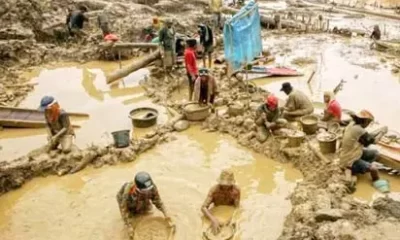Economy
Reps Move to Cancel Nigeria’s Loans From China

The House of Representatives has resolved to set up an investigation committee to look into all extant China/Nigeria loan agreements since 2000 with a view to ascertaining their viability, regularising and renegotiating them.
This was sequel to a unanimous adoption of a motion by Rep, Ben Igbakpa (PDP-Delta) at the plenary on Tuesday.
Moving the motion earlier, Igbakpa said that the National Assembly, the arm of government responsible for appropriation had been kept in the dark on how most of these Chinese loans were collected and utilised.
He said there is widespread global concern about the fraudulent, irregular and underhand characteristics of Chinese loan contracts with African states.
According to him, it has resulted to a new form of economic colonialism foist by China; there is an urgent need to subject all subsisting Nigeria/China contractual loan agreements to forensic fiscal scrutiny and review.
He said that records from Nigeria’s Debt Management Office (DMO) revealed that the People’s Republic of China emerged Nigeria’s major creditor under the bilateral deals with $2.3 billion out of $3.3 billion.
Igbakpa said that the EXIM Bank of China is Nigeria’s biggest bilateral creditor in nearly two decades, having lent the African largest economy $6.5 billion (N1.9 trillion) since 2002.
“Transportation and ICT sectors have six projects each financed by loans from the Chinese bank, while energy, agriculture and water sectors, respectively, have three and two projects tied to Chinese loans.
“According to the Daily Post of Sept. 5, 2018, the first Chinese loan to Nigeria was agreed on March 27, 2002, as follows: $114.89 million each for constructing two 335 MW gas power plants, namely Omotosho and Papalanto (Olorunshogo) in Ondo and Ogun States, respectively.
“Both plants were completed in 2007; the loan was obtained at six per cent interest rate and it covered 65 per cent of the costs of the project, while Nigeria then covered the 35 per cent balance.
“Four months after, two other loans totalling $159.83 million for rural telephony were offered at a 3.5 per cent interest rate.
“Then from 2006 to September 2018, the country obtained 13 more loans, at between 2.50 per cent and three per cent interest rates.
“The last loan obtained by the government from China was $328 million used for the National ICT Infrastructure Backbone II Project.
“At the last count Nigeria has obtained 17 Chinese loans to fund different categories of capital projects and Nigeria would still be servicing the Chinese loans till around 2038, the maturity date for the last loans obtained in 2018,” he said.
The legislator expressed concern that the IMF as reported in the Guardian of Nov. 3, 2019, had raised the alarm that most of the Chinese deals are not Paris Club compliant, and for which the The World Bank has blacklisted six Chinese companies currently operating in Nigeria.
According to him, this is over alleged fraudulent corrupt practices including deceptive tactics, illicit trade, extortion, Greek gifts and neo-colonial proclivities.
Igbakpa listed the companies as published on the World Bank’s website to include CCECC Nigeria Railway Company Limited, CRCC Petroleum and Gas Company Limited and CCECC Nigeria Company Limited.
Others are China Railway Construction (International) Nigeria Company Limited, China Railway 18th Bureau Nigeria Engineering Company Limited and CCECC Nigeria Lekki (FTA) Company Limited.
Igbakpa said that one of the blacklisted companies, China Civil Engineering Construction Corporation (CCECC), is the major vehicle through which Chinese projects in Nigeria are financed.
“This much has been corroborated by Minister of Transportation, Mr Rotimi Amaechi, who stated that since China was financing the projects through the China Civil Engineering Construction Corporation (CCECC), the contractors had 100 per cent execution right on them.
“This means that materials and skills are imported from China thus undermining local industry and jobs.
“The fact that some of the latest loans tied to the said CCECC as reported in Guardian of March 3, 2020, are as follows:
“On railway alone, this administration has recently signed loans mainly categorised under Belt and Road Initiative (BRI)’s government to government agreements of approximately $17 billion with China Civil Engineering Construction Corporation, a subsidiary of the state-owned China Railway Construction Corporation.
“The Federal Government in 2016 signed a $5.1 billion Kano–Kaduna and Port Harcourt-Calabar rail contracts; in 2018, the country signed a $6.7 billion for Ibadan-Kano rail.
“It signed in 2019, a deal worth $1.488 billion for Lagos–Ibadan rail and again in 2019 signed another loan for construction of $3.9 billion Abuja-Warri rail,” he said.
The lawmaker said that amidst widespread allegations of heavily inflated Chinese contracts and fears expressed by stakeholders that most of the projects allegedly did not follow extant regulations, particularly the Public Procurement Act, which enforces tendering or competitive bidding.
He said that industry watchers have also raised fears over why the Public Procurement Bureau (PPB), the National Assembly and Debt Management Office were bypassed in the approval and execution of these loan regimes.
He said this was done knowing full well that 70 per cent of the corruption in the country is being fuelled by contracts.
Igbakpa said that Nigeria is the most vulnerable in the bilateral loan pacts with China because Nigeria is susceptible to currency volatility risks.
According to him, such risks, most often are transferred to the country with a weaker economy.
“In this connection, we must heed the warning of the IMF Director of Monetary and Capital Markets Department, Tobias Andrian, in the Guardian Sunday Magazine of Nov. 3, 2019.
“It says that because these Chinese loans do not conform to the Paris Club standards, if there is any debt restructuring down the road one day, that can be very unfavourable to those debtor countries,” he said.
Igbakpa recalled that in Business Day of May 14, 2019, countries like Sri Lanka, Zimbabwe, Djibouti, Zambia, Namibia, Kenya and Angola, are at the verge of forfeiting their infrastructures to China over unpaid debts.
He said that industry watchers such as Obadiah Mailafiya, a former Deputy Governor of Nigeria’s Central Bank, who played a key role in Nigeria’s debt relief negotiations with the Paris Club of public creditors in 2005, and Dr Oby Ezekwesili who also helped Nigeria’s debt forgiveness during her time as Director at the World Bank, have warned.
According to him, they said that the assistance from China will come with a price of economic takeover if Nigeria is unable to repay her loan.
The legislator said that the Chinese attitude to indebtedness is the hardest in the world as they do not offer debt relief or cancellation.
“Further worried by the startling revelation as published in an online article by Mma Ama Ekeruche in Stears Business Economy Oct. 26, 2018, that Chinese companies generate their highest revenue from Nigeria.
“Between 2000 and 2016, these companies have earned $34.2 billion from implementing projects in Nigeria, some of which are tied to loan agreements.
“On employment, about 64,500 Chinese workers are employed locally thus we are forgoing alternative streams of income and jobs,” he said.
The house resolved that in the light of the COVID-19 starting from China, the House Committees on Treaties, Protocols and Agreements, Finance as well as Debt Management be mandated to liaise with the Ministry of Finance and the Debt Management Office to seek for review or outright cancellation of latest China loans to Nigeria, on the principle of force majeur.
The green chamber also recommended that henceforth, loans should be in tandem with statutory obligations as prescribed by the Fiscal Responsibility Act. (NAN)
Economy
SEC Advocates Advanced Financial Inclusion by 2030

By Tony Obiechina, Abuja
The Securities and Exchange Commission (SEC) has stressed the need for Nigeria to harness its demographic dividend to advance financial inclusion through investments by 2030 for national survival or face deepening inequality.
The Director-General of the SEC, Dr Emomotimi Agama said this at the United Capital Asset Management Investment forum on Wednesday in Lagos.
Agama, in his keynote address titled: “Advancing Financial Inclusion through Investments: Bridging
Nigeria’s Knowledge and Wealth Gap,” said Nigeria must harness its demographic dividend to boost investment.
“Our theme, Advancing Financial Inclusion through Investments, is not aspirational; it is foundational to national survival.
“We stand at a pivotal moment. By 2030, Nigeria can either harness its demographic dividend or face deepening inequality. The knowledge-wealth gap is not merely an economic challenge; it is a moral imperative,” Agama said.
He said the term inclusion should be reframed as active financial involvement, where access meets empowerment, and capital becomes a tool for transformation.
Agama said that closing the financial inclusion gender gap could lift 700,000 Nigerians from poverty.
He said, “Nigeria has a great population yet we have a tiny drop of this number of persons involved in the capital market.
“That one reason for poverty, because we are running from money. We have to do something. Our market capitalisation is an opportunity to do something,
We all have
“We need to change the narrative and move the market forward. We must reach out to make the difference. We are committed to protecting investors and developing the market. Our goal is to do the right thing no matter whose ox is gored. We will work by the principles of fairness and equity to change the market. We will provide a fair ground for everyone to aspire.
He noted that MTN Nigeria’s share offering drew 150,000 new investors – 75 per cent women, 85 per cent under 40.
Agama recommended a four-pillar strategy for bridging the gaps.
He listed the four-pillar strategy as democratisation of financial knowledge, catalyse MSME Investment Channels, blended Finance Vehicles: Partner with Bank of Industry (BOI) to de-risk loans for women-led SMEs.
“We need to educate people about finances. As we drive this market, we do so for a purpose, I enjoin everyone to be the disciple and the apostles. Getting this market to move is a deliberate action,” he added.
| ReplyReply allForwardAdd reaction |
Economy
NPA Assures of Over N1.27trn Revenue in 2025

By Ubong Ukpong, Abuja
The Nigerian Ports Authority (NPA) on Monday assured that it would take into the coffers massive revenue of over N1.27 trillion in 2025, representing a 40 percent increase from the N894.86 billion it realized in 2024.
This ambitious target, the Authority said, was anchored on sweeping modernization efforts, the full activation of the Dangote Refinery’s marine operations, and the deployment of cutting-edge technology to enhance port efficiency.
Managing Director of the NPA, Abubakar Dantsoho, disclosed this in a presentation during his agency’s budget defence session wih the House of Representatives Committee on Ports and Harbours, where he defended the agency’s 2025 budget estimates and provided insights into its 2024 performance.
“Our 2025 budget proposal is more than figures, it reflects our aspirations for a more efficient, globally competitive port system,” Dantsoho told lawmakers, adding that over 70% of the proposed expenditure will go into capital projects.
For 2024, the Authority surpassed its revenue target of N865.39 billion, posting an actual realization of N894.86 billion.
However, Dantsoho revealed that only N417.86 billion, less than half of the approved N850.92 billion expenditure, had been spent as of the time of reporting.
Despite this, NPA made a record contribution of N400.8 billion to the Consolidated Revenue Fund (CRF) in 2024, nearly double the N213.23 billion remitted in 2023. Of this amount, a staggering N344.7 billion was deducted at source.
“This shows our unwavering commitment to national revenue generation, even when our own operational liquidity is affected,” the NPA boss stressed.
Dantsoho said the projected revenue increase is premised on several key assumptions and developments, including: The full operation of the Dangote Refinery, which alone is expected to draw in over 600 vessels annually through its Single Point Mooring (SPM) system; the commissioning of upgraded terminals at WACT and OMT, which will enhance container traffic; the implementation of automation tools such as the National Single Window, Port Community System (PCS), and Vessel Traffic Management System (VTMS); and increased cargo volumes stemming from global disruptions, including the Russia-Ukraine conflict, which has affected global trade routes.
He said the 2025 revenue is expected to come from the following key sources: Ship Dues, N544.06 billion; Cargo Dues, N413.06 billion; Concession Fees, N249.69 billion; and Administrative Revenue, N73.07 billion
Of the proposed N1.14 trillion total expenditure for 2025, N778.46 billion is earmarked for capital projects.
This investment, he said, will target the revitalization of critical infrastructure, including the Calabar, Warri, and Burutu ports and channels, and enhance towage services, channel depth, and compliance with international security conventions.
“Investments in infrastructure and technology are non-negotiable if we are to stay competitive regionally and globally,” Dantsoho emphasized.
He cited increasing competition from neighboring ports and aging assets across Nigeria’s coastal corridors.
The NPA also intends to address technology gaps by upgrading legacy systems and bolstering cybersecurity, ensuring Nigerian ports meet global standards for digital operations.
“We can say that with timely access to internally generated revenue and capital funds NPA would deliver the kind of impact Nigeria expects,” he said.
Chairman of the Committee, Hon. Nnolim Nnaji, urged the NPA to ramp up performance, improve port infrastructure, and play a greater role in addressing Nigeria’s revenue and unemployment challenges.
Nnaji said the ports remain a critical pillar of Nigeria’s economy, and urged the agency to meet rising expectations despite operational challenges.
“No country can thrive economically without high-performing ports. They are the economic heartbeat of every nation, determining how buoyant a country is through the flow of imports and exports,” Hon Nnaji said.
The committee praised NPA for its performance.
Nnaji stressed that the NPA’s performance has implications beyond maritime activity, noting that increased port output can significantly boost job creation across several sectors.
“The Nigerian Ports Authority is not just a revenue-generating agency, it is a national asset in terms of employment and economic impact.
“We expect to see detailed strategies on how to improve revenue generation and expand employment opportunities through your 2025 budget,” he said.
The lawmaker also pointed to growing interest in the development of new ports across the country but cautioned against neglecting existing port infrastructure.
“As we welcome investment in new ports, we must not abandon the old ones. Maintaining and upgrading our existing ports, both in the Eastern Corridor and the Western axis, is essential to long-term sustainability,” he added.
The Committee called for a clear outline from the NPA on how its 2025 financial plan will address pressing national concerns and reaffirm Nigeria’s competitiveness in regional and global maritime trade.
Economy
Senate Sets N10trn Revenue Target for NCS, Urges Agency to Curb Smuggling, Illicit Drugs

By Eze Okechukwu, Abuja
The Senate, through its Committee on Customs has set a revenue target of N10 trillion for the Nigeria Customs Service for the 2025 fiscal year, instead of the initial N6.584 trillion given to her earlier on while urging the agency to clamp down on smuggling and Illicit drugs.
The Chairman of the Committee, Senator Isah Jibrin (Kogi East), who gave the agency the marching order yesterday in Abuja during the budget defence of the revenue driving agency however commended her for exceeding its 2024 revenue target of N5.
079 trillion.The NCS team led by Deputy Comptroller General, Jibo Bello who represented the Comptroller General presented the 2024 budget performance with a revenue target of N5.
079 trillion, stressing that the proposal was exceeded by over a trillion naira.The Committee, obviously impressed by the performance commended NCS before asking them to go ahead and present the 2025 budget proposal, which the agency tied at N6.584 trillion revenue target with an expenditure of N1.132 trillion.
Following their presentation, members of the Senate Committee on Customs unanimously approved the recommendation of the revenue target of N6.584 trillion and the expenditure of N1.132 trillion for the 2025 financial year.
The Committee will subsequently present the budget proposal to the Senate at plenary most likely this week as the red chamber resumes today after a long recess tied to Eid celebration.
In his final remarks, Senator Jibrin emphasised the need for the NCS to rise up in terms of its surveillance with respect to illicit drugs and smuggling “to ensure that, as much as possible, you should be on top of your game”.
He said there are so many illicit drugs flowing all over the place, which according to him “is contributing to the issue of banditry in Nigeria because most of these guys are on drugs. What I’m saying is that, in addition to your revenue drives, you should also be mindful of some of these other functions.






















